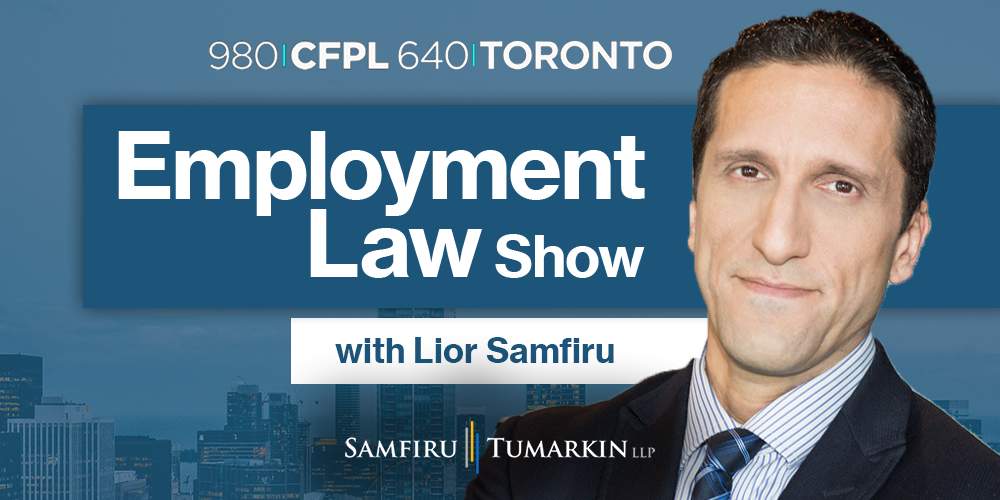Employment Law Show 640 Toronto – S9 E79

Episode Summary
Myths regarding severance entitlements, vaccinations in the workplace, and more on Season 9 Episode 79 of the Employment Law Show on Global News Radio 640 Toronto.
Listen below as an employment lawyer at Samfiru Tumarkin LLP reveals your workplace rights in Toronto and the GTA on the Employment Law Show. He shatters myths and misconceptions about severance pay, terminations, workplace harassment, overtime pay, wrongful dismissal, constructive dismissal, duty to accommodate, independent contractors, and more.
Listen to the Episode
Episode Notes
Are employees entitled to a week per year of employment for severance?
Employees should remember that severance pay is based on a number of factors including the length of employment, the age of the employee as well as the position of the employee. It is important to speak to an employment lawyer if an employee is unsure of the severance offer their employer has offered them.
If you are fired for cause are you owed severance?
Employees who are terminated for cause are often terminated for the wrong reasons. Terminations for cause are difficult to prove and are only permissible if an employee has engaged in serious misconduct and there are no other options other than termination. Employers have to be able to show progressive discipline and documentation to prove they have tried to resolve the situation.
What are the exemptions for employees who do not wish to be vaccinated?
Under the human rights code in Ontario, a creed is considered a protected ground and religions are typically included under that banner. Medical conditions are also considered to be a protected ground under the human rights code. Employees who are provincially regulated should remember that the Ontario government has not mandated vaccinations
Are employers obligated to test vaccinated staff as well as unvaccinated?
Employers are obligated to provide a healthy and safe work environment for all employees and should be following public guidelines in order to do so. Employees who feel their workplace is unsafe should communicate their concerns with their employer.
LEARN MORE
• COVID-19 Rights
• How to respond if you’re being pressured to get vaccinated
Do contract workers get severance if they are terminated?
Many employees are often misclassified as independent contractors by their employers. Despite what an employer labels a relationship, only employment law dictates if an individual is an employee. Individuals who are on a fixed-term contract who are let go before the end of their contract, are owed the balance of the remaining contract.
What can an employee do if the deadline to negotiate a severance offer has expired?
Deadlines are arbitrary and typically put forth by an employer in order to pressure an employee to accept the initial severance offer. Employees have two years after the initial date of termination to pursue their severance entitlements. Employees should contact an employment lawyer as soon as possible and particularly if their former employer is no longer responding to communication.
LEARN MORE
• Severance Entitlements in Ontario
• Severance Pay in Alberta
• Severance Packages in B.C
I share a workspace with a co-worker who is unvaccinated. Do I have to work with them?
Employees cannot force other employees to be vaccinated and should remember the proper health and safety protocols that are to be followed in the workplace. Employees are permitted to bring forth their concerns with their employer regarding their safety.
Do short service employees get severance?
Short service employees are entitled to severance and at times are owed more severance in comparison to longer service employees. Severance does take into account the possibility of future employment.
Are employers allowed to change the terms of an employee’s job such as their pay or schedule?
Employers are not permitted to implement fundamental changes to the terms of employment without an employee’s consent. Substantial changes without the consent of an employee can lead to constructive dismissal despite the pandemic. A significant increase in work is also considered to be a major change. Employees should be wary of initially accepting a change to the terms of their employment as it can be considered implied consent.




